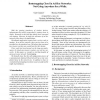Free Online Productivity Tools
i2Speak
i2Symbol
i2OCR
iTex2Img
iWeb2Print
iWeb2Shot
i2Type
iPdf2Split
iPdf2Merge
i2Bopomofo
i2Arabic
i2Style
i2Image
i2PDF
iLatex2Rtf
Sci2ools
114
click to vote
PERCOM
2006
ACM
2006
ACM
Bootstrapping Chord in Ad Hoc Networks: Not Going Anywhere for a While.
With the growing prevalence of wireless devices, infrastructure-less ad hoc networking is coming closer to reality. Research in this field has mainly been concerned with routing. However, to justify the relevance of ad hoc networks, there have to be applications. Distributed applications require basic services such as naming. In an ad hoc network, these services have to be provided in a decentralized way. We believe that structured peer-to-peer overlays are a good basis for their design. Prior work has been focused on the long-run performance of virtual peer-to-peer overlays over ad hoc networks. In this paper, we consider a vital functionality of any peer-to-peer network: bootstrapping. We formally show that the self-configuration process of a spontaneously deployed Chord network has a time complexity linear in the network size. In addition to that, its centralized bootstrapping procedure causes an unfavorable traffic load imbalance.
| Added | 14 Dec 2010 |
| Updated | 14 Dec 2010 |
| Type | Journal |
| Year | 2006 |
| Where | PERCOM |
| Authors | Curt Cramer, Thomas Fuhrmann |
Comments (0)

